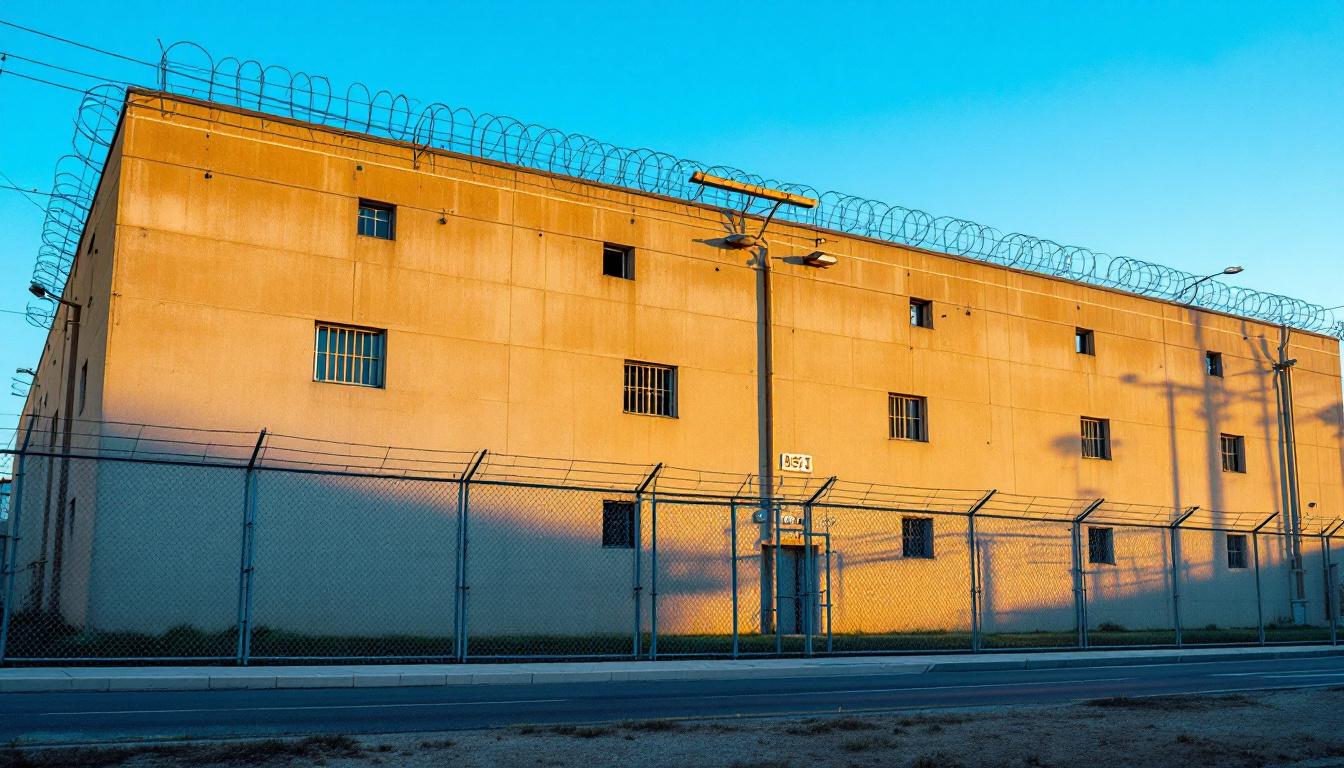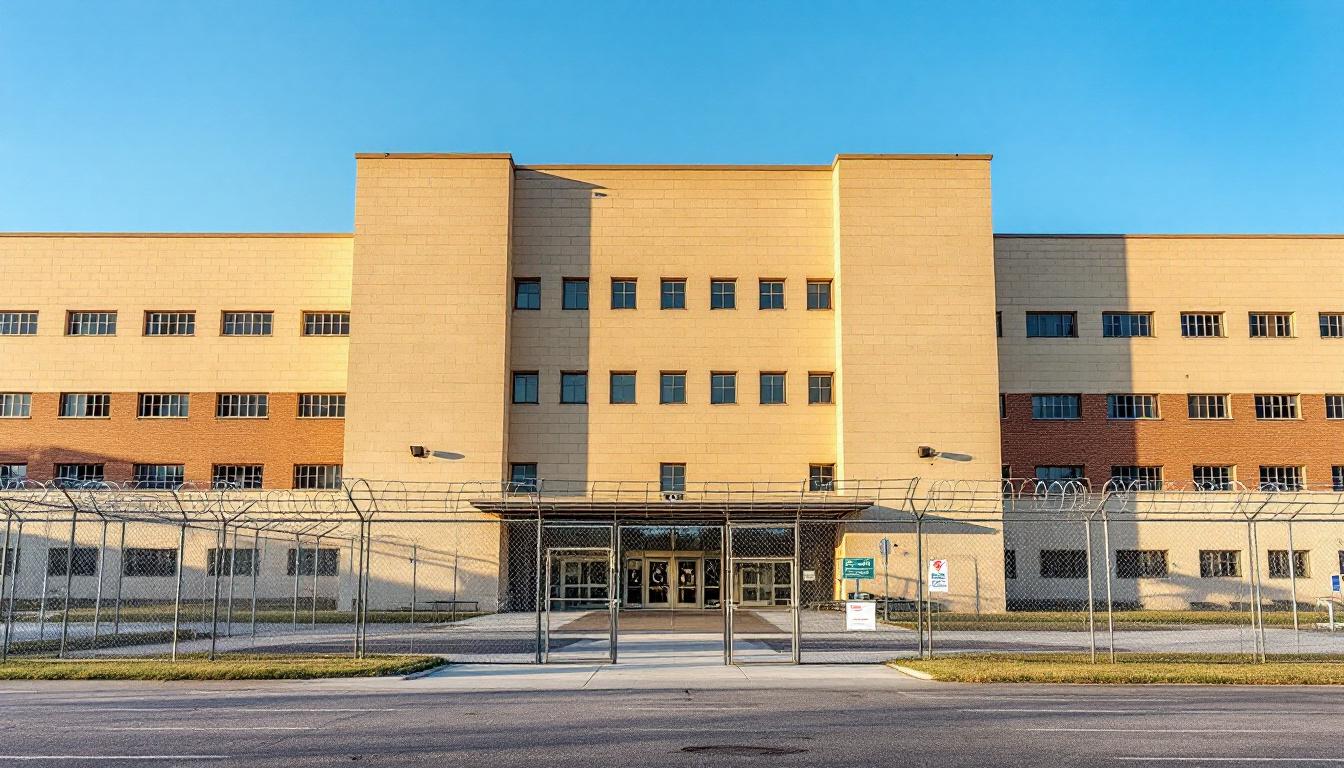
Quick Navigation
How to contact an inmate at Bates County Sheriff's Office
This comprehensive guide will walk you through how to connect with an inmate at Bates County Sheriff's Office. Follow the steps below to find an inmate and send letters and photos:
- Search for the inmate using our search tool below
- Create your account or log in to Penmate
- Write your message (up to 6,000 characters)
- Send instantly - inmates receive printed copies daily
Find an Inmate
Search for an inmate to start communicating today
Tip: You can search by first name, last name, or inmate ID number
To contact a person at Bates County Sheriff's Office start by searching for the person on the official facility website. Perform a search by following these steps:
- Step 1: Enter their first name and last name into the search form and click "Search"
- Step 2: Locate their inmate record
- Step 3: Write down their Inmate ID and any housing information provided
Important! Be sure to enter the person's full name. Nicknames should not be used.
How to Send Messages to Inmates

You can use your phone or computer to send emails, letters, and photos to an inmate. Messages are sent electronically to inmate tablets or kiosks at the facility. If you would like to send a message, start by searching for an inmate at Bates County Sheriff's Office.
Sending Photos and Postcards

A great way to send love and support to a loved one at Bates County Sheriff's Office is to send photos and postcards. It only takes a few minutes to send photos from your phone and it makes a huge difference. You can also mail postcards with words of support and inspiration, or design your own postcard for special moments like birthdays and holidays.
Important! Be sure not to send any explicit photos or they may not be approved by the facility. You can also use a photo printing app like Penmate to make sure your photos are printed at the correct size (4x6 or 3x5) and are mailed according to the rules and regulations of Bates County Sheriff's Office.
Frequently asked questions about Bates County Sheriff's Office
-
How long does it take to deliver a message?
If you're sending an email message your letter is usually delivered within 24-48 hours. For messages sent via mail you should expect delivery within 3-7 days. All messages will need be approved by Bates County Sheriff's Office.
-
How much does it cost to send a message to Bates County Sheriff's Office?
You can send a message free using your phone or mail a message via USPS for the price of a $0.60 stamp and envelope. You can also purchase credits or e-stamps from services starting at $1.99.
-
What services can I use to contact an inmate at Bates County Sheriff's Office?
Penmate
You can use Penmate to send letters and photos to an inmate from your phone. It's an easy way to stay in touch during your loved one's incarceration. Use the inmate locator to find an inmate's location and contact information, then you can send messages within a few minutes.
Securus messaging
Securus may be another option for communicating with an inmate at Bates County Sheriff's Office. You can create a friends and family account and purchase credits to send messages. All messages will be reviewed and must be approved by the facility.
JPay
Some county jails and state prisons may support sending messages with JPay. You must register an account with the system, find your loved one, and purchase stamps to send messages. For some locations you can also attach photos.
Smart Jail Mail
You may also check if Smart Jail Mail is available at Bates County Sheriff's Office. Smart Jail Mail is operated by Smart Communications and has contracted with some state and county jails. After purchasing credits, your messages and photos are sent to the facility, printed out, and then handed out to your loved one.
-
What is the mailing address of Bates County Sheriff's Office?
Mailing address:
Bates County Sheriff's Office
6 W Fort Scott St
Butler, MO 64730
Phone: (660) 679-3232Business hours:
- Monday: Open 24 hours
- Tuesday: Open 24 hours
- Wednesday: Open 24 hours
- Thursday: Open 24 hours
- Friday: Open 24 hours
- Saturday: Open 24 hours
- Sunday: Open 24 hours
-
What are the visiting hours at Bates County Sheriff's Office?
Visiting hours at Bates County Sheriff's Office vary by housing unit and security level. Generally, visits are scheduled on weekends and holidays, with some facilities offering weekday visits. Contact the facility directly at (660) 679-3232 or check their website for the current visiting schedule. Visits typically last 30-60 minutes and must be scheduled in advance.
-
What items are prohibited when sending mail to Bates County Sheriff's Office?
Prohibited items typically include: cash, personal checks, stamps, stickers, glitter, glue, tape, staples, paperclips, polaroid photos, musical or blank greeting cards, hardcover books, magazines with staples, and any items containing metal or electronics. Only send letters on plain white paper with blue or black ink. Photos must be printed on regular photo paper (no Polaroids). Always check with Bates County Sheriff's Office for their specific mail policies.
-
How do I send money to an inmate at Bates County Sheriff's Office?
You can send money to an inmate at Bates County Sheriff's Office through several methods: 1) Online using JPay, Access Corrections, or the facility's approved vendor, 2) Money orders mailed directly to the facility with the inmate's name and ID number, 3) Kiosks located in the facility lobby, or 4) Over the phone using a credit or debit card. Fees vary by method, typically ranging from $2.95 to $11.95 per transaction.
-
Can I schedule a video visit with an inmate at Bates County Sheriff's Office?
Many facilities now offer video visitation as an alternative to in-person visits. At Bates County Sheriff's Office, video visits may be available through services like Penmate, Securus Video Connect, GTL, or ICSolutions. Video visits typically cost $10-20 for 20-30 minutes and must be scheduled in advance. You'll need a computer or smartphone with a camera and reliable internet connection. Contact the facility for their specific video visitation policies and approved vendors.
-
What identification do I need to visit an inmate at Bates County Sheriff's Office?
All visitors must present valid government-issued photo identification such as a driver's license, state ID, passport, or military ID. Minors must be accompanied by a parent or legal guardian who can provide the minor's birth certificate. Some facilities require visitors to be on the inmate's approved visitation list, which may require a background check. Contact Bates County Sheriff's Office for specific ID requirements and visitor approval procedures.
-
How can I find out an inmate's release date?
To find an inmate's release date at Bates County Sheriff's Office, you can: 1) Use the online inmate search tool if available, 2) Call the facility's records department, 3) Contact the inmate's case manager or counselor, or 4) Have the inmate provide this information during a call or visit. For privacy reasons, some facilities only release this information to immediate family members.
Facility Overview
Contact Information
Bates County Sheriff's Office6 W Fort Scott St
Butler, MO 64730
Phone: (660) 679-3232
Official Website

About Bates County Sheriff's Office
Community safety and justice intersect daily within Butler, Missouri, where local law enforcement and judicial systems rely on comprehensive detention services to maintain public order. The Bates County Jail, MO serves as a cornerstone facility in this rural Missouri community, providing secure housing and structured programming for individuals awaiting trial or serving shorter sentences. This MO correctional facility operates within the broader framework of Missouri's county-level justice system, typically coordinating with local courts, law enforcement agencies, and community organizations to address both immediate detention needs and longer-term public safety concerns.
Beyond basic detention services, the facility generally emphasizes structured daily routines and inmates services designed to support both security and personal development during incarceration. Programming may include educational opportunities, substance abuse counseling, and work assignments that help maintain facility operations while providing meaningful activity. The county jail approach often focuses on preparing individuals for successful reintegration into the Butler community, with rehabilitation efforts that may encompass life skills training, mental health support, and coordination with local service providers. Staff typically work to balance security requirements with supportive interventions, recognizing that effective offender management extends beyond confinement to include preparation for eventual release and community reentry.
Programs & Services
Personal transformation begins with opportunity, and the comprehensive array of services at Bates County Jail typically emphasizes skill-building and behavioral change as cornerstones of inmate development. Rather than merely focusing on confinement, the facility often prioritizes equipping individuals with practical competencies and therapeutic insights that may prove instrumental in their successful reintegration into society. This multifaceted approach recognizes that meaningful rehabilitation requires addressing both the underlying causes of criminal behavior and the practical barriers that inmates frequently encounter upon release.
Educational services often form the foundation of personal development opportunities, with programs that may include basic literacy instruction, GED preparation, and continuing education coursework designed to enhance academic credentials. In addition to this educational framework, vocational training services typically provide hands-on experience in marketable trades, with culinary arts programs often serving as particularly valuable pathways to employment in the food service industry. These skill-based initiatives generally emphasize both technical proficiency and workplace readiness, preparing inmates for sustainable career opportunities that can support long-term stability.
Support services frequently extend beyond traditional educational offerings to encompass specialized training in areas such as commercial driving (CDL) preparation and communication skills development, which may prove essential for professional advancement. Agriculture programs often provide unique opportunities for inmates to develop both practical farming skills and an understanding of sustainable practices that can translate into various employment sectors. In addition to this diverse array of skill-building services, substance abuse treatment typically addresses the underlying addiction issues that may have contributed to criminal behavior, offering therapeutic interventions designed to support lasting behavioral change and reduce recidivism rates.
Daily Life & Visitation

The concrete walls and fluorescent lighting of the housing units create a stark institutional environment where inmates at Bates County Jail must learn to navigate the rhythms of structured confinement. At present, the facility actively maintains a regimented schedule that begins with early morning wake-up calls, followed by headcount procedures and preparation for the day ahead. Inmates typically move through their daily routines under close supervision, with structured time blocks allocated for meals, programming, and personal activities that provide essential order to institutional life.
Living accommodations generally consist of shared cells or dormitory-style housing units, where inmates must adapt to limited personal space and the constant presence of others. The environment typically includes basic furnishings such as metal bunks, small storage areas for approved personal property, and shared bathroom facilities that serve multiple residents. In addition to this basic setup, inmates usually have access to common areas where they may watch television, play games, or engage in quiet conversation during designated recreation periods, though these privileges often depend on good behavior and compliance with facility rules.
Despite this controlled environment, the facility generally provides various programming opportunities that help inmates maintain connections with the outside world and develop useful skills. Work assignments may include kitchen duties, cleaning responsibilities, or maintenance tasks that provide structure and purpose to daily life. Visitation policies typically allow for scheduled meetings with family members and friends, while telephone privileges and mail correspondence provide additional means of maintaining important relationships during incarceration, helping inmates cope with the challenges of institutional living.
Ready to Connect?
Start communicating with your loved one today
Search for an Inmate









